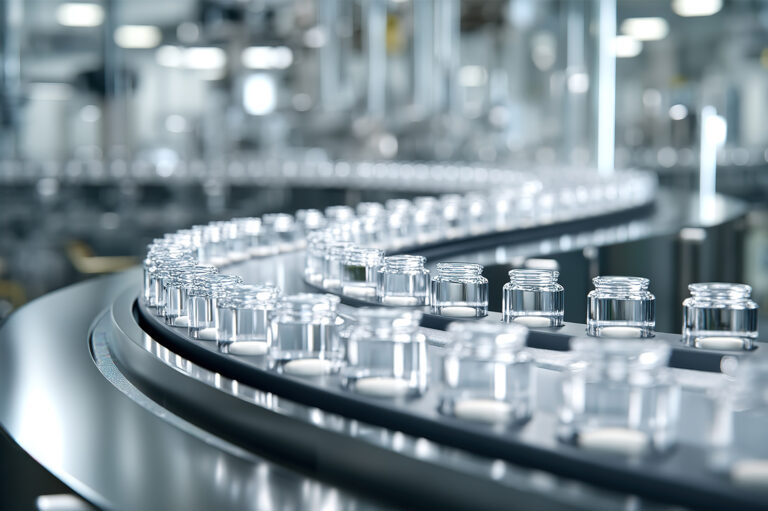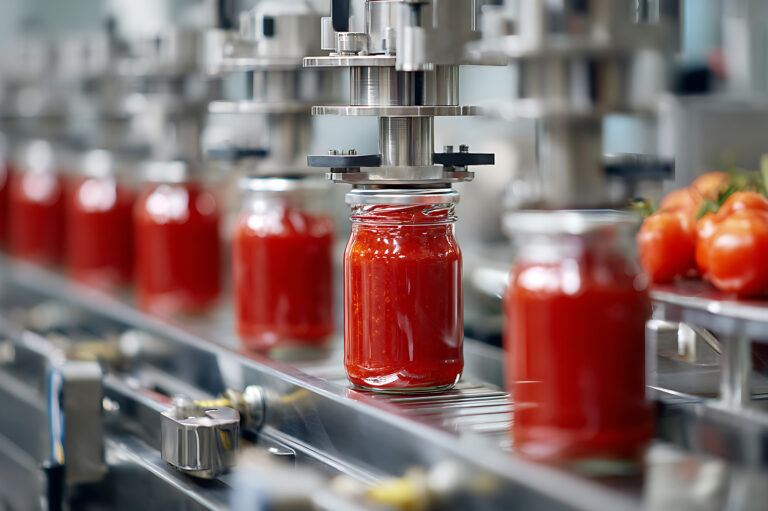August marks a turning point for UK food manufacturers. Harvest season peaks whilst Christmas production planning begins. Decisions made this month determine success through the year’s busiest manufacturing periods.
The food and drink sector employed 3.8 million people in 2024 (11.9% of GB employment) and generated £132.9bn GVA in 2022. With this scale of operation, even small efficiency gains during seasonal peaks translate to significant competitive advantages.
Packaging decisions directly impact seasonal production efficiency. The right materials support flexible manufacturing, whilst poor choices create bottlenecks during critical periods. Glass packaging aligns with UK food manufacturing seasonality, creating opportunities for improved efficiency, reduced risk, and enhanced product quality.
UK Food Manufacturing Overview
UK food manufacturing operates on massive scale. The agri-food sector contributed £146.7bn to the economy in 2022 (6.5% of national GVA).
Seasonality defines production patterns. Seasonal demand repeats across categories – from fresh produce processing to premium gifts. Jam and preserve production demonstrates this: year-round demand exists, but production peaks during August-September harvest periods when fruit is abundant and processing capacity must scale rapidly.
Seasonal cycles create operational challenges: scaling production capacity, managing ingredient availability, coordinating supply chains, and maintaining quality standards during variable throughput periods. These challenges intensify during August, when multiple seasonal pressures converge simultaneously.
When Seasonal Pressures Converge
August brings converging seasonal pressures that make packaging strategy critical. Peak summer fruits require immediate processing for preserves and jams. Christmas production planning enters its critical phase – festive products need packaging procurement, recipe finalisation, and production scheduling for November-December delivery.
Wedding season adds complexity. Peak ceremonies continue through September-October, creating sustained demand for wedding favour packaging.
September delivers the year’s most abundant British produce. Summer crops remain productive whilst autumn harvests begin. This abundance requires processing capacity and packaging solutions handling diverse product requirements simultaneously.
The compressed timing creates operational pressure. UK suppliers report: “Even in August, fruit is ripening on the trees; far earlier than it would have done in the past. From orchards to blackberry bushes, it’s vital to preserve precious fruit stores before they rot.” Harvest windows cannot be delayed, making reliable packaging supply essential.
Current Challenges Intensifying Seasonal Pressures
UK food manufacturers face acute seasonal workforce pressures. The seasonal worker visa quota rose from 2,500 in 2019 to 45,000 in 2024, yet 67% of food companies still report seasonal labour shortages. Over half (56%) face chronic shortages in lower skilled roles essential for harvest processing.
Supply chain disruption compounds these challenges. Brexit reduced EU glassware imports by 32% between 2021-2023, with customs delays extending delivery timelines by an average of 30%. This affects packaging procurement precisely when seasonal production demands reliable supply.
The result is measurable impact on UK food production. A 2023 National Farmers’ Union survey found 41% of respondents had reduced food production due to workforce shortages. Individual farmers have left crops worth hundreds of thousands of pounds unharvested.
These pressures make packaging strategy critical. When production windows are non-negotiable and labour is constrained, packaging materials must support maximum efficiency rather than create additional complications.
How Glass Packaging Addresses Seasonal Demands
UK seasonal production creates specific scenarios where glass packaging provides measurable advantages over alternatives.
Cider Production Timing
UK cider producers follow strict seasonal patterns tied to harvest. Most operations begin pressing in August, continue through October, with bottling occurring in late January to February. Apple harvest timing is critical – early season apples start in August, with premium varieties requiring harvest until December. Glass bottles support the premium positioning essential for craft cider pricing whilst handling the thermal requirements of traditional processing methods.
Preserve Season Processing
August fruit processing demands packaging supporting hot-fill applications whilst maintaining quality throughout extended shelf life. The abundance of seasonal produce requires packaging solutions that glass containers accommodate through standardised neck finishes and closure systems. Glass handles thermal processing without cooling cycles that reduce throughput during time-critical harvest windows.
British Hop Harvest Impact
UK hops are harvested in September, creating concentrated demand for craft beer bottles. The British hop harvest involves processing in “just a few weeks” with September being the month when “the hop growing year culminates.” Craft brewers require glass bottles for premium positioning and quality preservation of fresh hop beers – the artisan market demands glass packaging to support premium pricing and brand perception.
Wedding Favour Market
Wedding season creates sustained demand for small-format packaging suitable for personalisation. Wedding favours represent a long-standing UK tradition. Glass containers provide aesthetic appeal and customisation options whilst offering practical filling and closure options that support seasonal gift production.
Supply Chain Reliability
Glass packaging maintains consistent supply availability during peak seasonal periods. For premium and craft producers, glass packaging is essential for market positioning – artisan preserves, craft ciders, and boutique spirits require glass containers to justify premium pricing and appeal to quality-conscious consumers.
Storage advantages become critical during production surges. Glass containers maintain product integrity during extended storage, allowing manufacturers to process seasonal ingredients when available and release products according to market timing rather than packaging availability limitations.
Future-Proofing Seasonal Operations
Upcoming regulatory developments favour glass packaging for seasonal production. Digital Product Passports may become mandatory by 2027, demanding comprehensive tracking of environmental impact throughout supply chains. Glass packaging’s established recycling infrastructure and simplified material composition support compliance with emerging traceability requirements.
Consumer research shows 71% consider recycled plastic packaging more acceptable, yet 64% find it difficult to know which packaging is most sustainable. Glass packaging’s clear environmental credentials reduce marketing complexity whilst supporting sustainability reporting requirements during busy seasonal periods when documentation streamlining matters most.
Extended Producer Responsibility regulations emphasise packaging lifecycle management. Glass packaging’s infinite recyclability and established collection infrastructure reduce compliance burden whilst supporting circular economy objectives – particularly valuable when seasonal production teams need simplified processes rather than additional administrative burden.
Your August Action Plan
The seasonal decisions you make this month set the tone for your busiest production periods. Glass packaging transforms August’s converging pressures – harvest timing, Christmas planning, labour constraints – into competitive advantages through reliable supply, efficient thermal processing, and premium positioning.
The choice is clear: adapt your packaging strategy to seasonal realities or let seasonal challenges constrain your operations. Glass containers offer the flexibility and reliability that seasonal food production demands.
Ready to optimize your seasonal production? Explore our online shop’s complete range of glass jars and glass bottles designed for UK food manufacturing requirements.
For technical specifications and compliance documentation supporting seasonal production planning, contact our technical team for specific seasonal production requirements.


